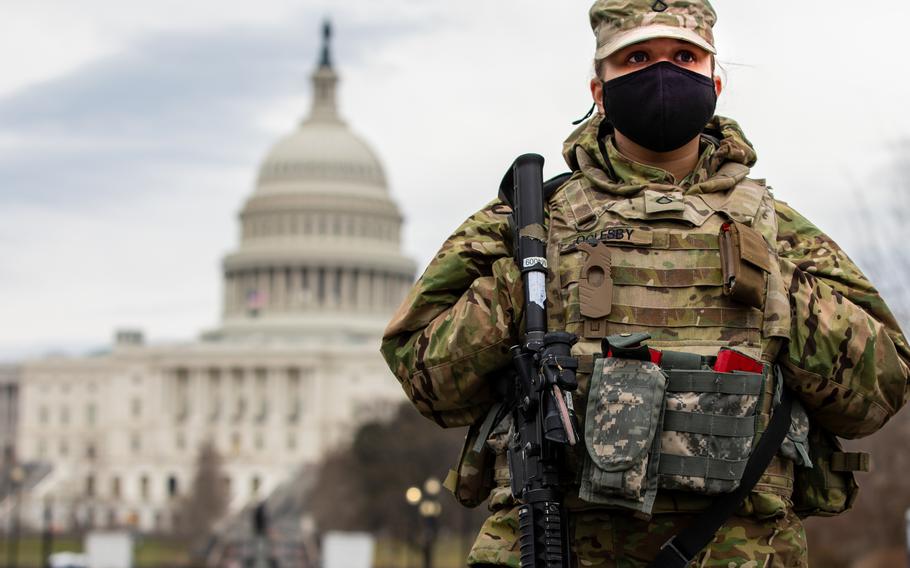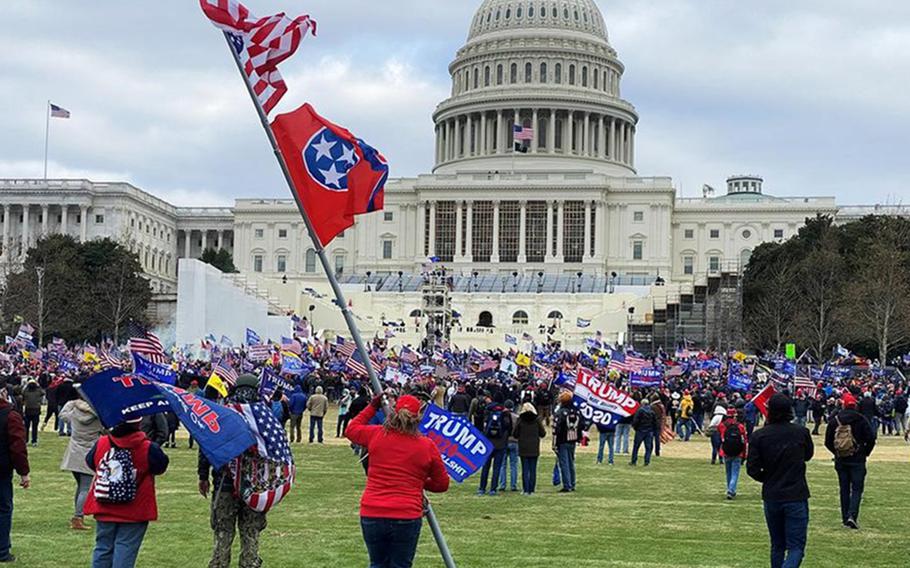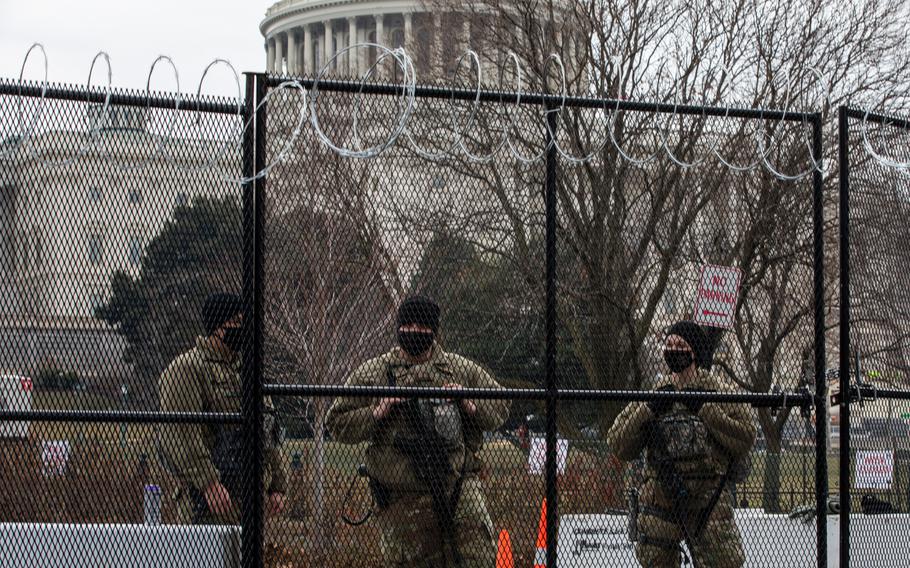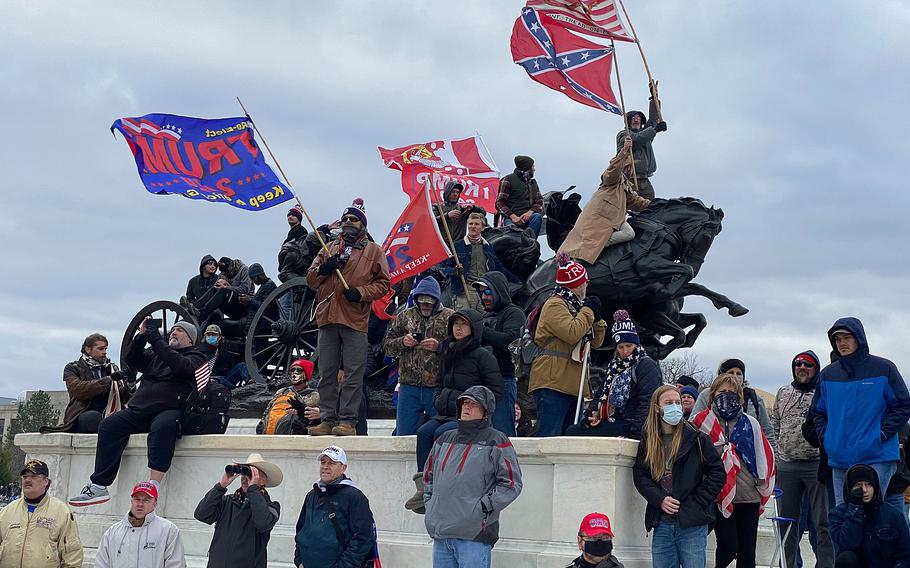
U.S. Army Pfc. Teri Oglesby, of the Indiana National Guard, provides security near the U.S. Capitol in Washington, March 1, 2021. The National Guard supported local and federal law enforcement in the wake of the Jan. 6 insurrection at the Capitol. (R.J. Lannom/U.S. Army)
Military veterans express support for extremism at low rates and are less likely to back far left movements or white supremacist groups than the general U.S. population, according to a new survey.
“We found no evidence to support the notion that the veteran community, as a whole, exhibits higher rates of support for violent extremist groups or extremist beliefs than the American public,” said Todd Helmus, lead author of the Rand Corp. survey released Tuesday.
The findings come at a time of heightened concern about radicalism both inside the ranks and among veterans. Questions about political extremists potentially flourishing among veterans also intensified in the aftermath of the Jan. 6 attacks on Capitol Hill, which included veterans who later faced an array of charges for fomenting violence.
“Given the anecdotal information about extremist group recruitment preferences and their active targeting of veterans, we would have assumed that these reported prevalence rates would be higher,” Helmus said. But Rand’s survey found the views of veterans mostly to be in line with other Americans.

Supporters of President Donald Trump stand outside the U.S. Capitol on Jan. 6, 2021. Although multiple veterans were later charged and sentenced for their roles in the ensuing Capitol riot that day, a new Rand Corp. study found that veterans are less likely than the general American public to hold extremist views. (Robert H. Reid/Stars and Stripes)
About 5.5% of veterans expressed support for the far-left antifa, an umbrella description of decentralized groups with a “militant opposition to fascism and other forms of extreme right-wing ideology,” according to Rand Corp., a nonpartisan research group.
Adherents frequently blend communist and anarchist views and have resorted to vandalism and violence when targeting far-right rallies, the nonpartisan Center for Strategic and International Studies wrote in a 2020 analysis.
Veteran support for antifa was considerably lower than the U.S. population rate of 10%, Rand said. Veterans also expressed much lower support for white supremacists than the general U.S. population — 0.7%, compared to 7%.
The far-right Proud Boys group had the support of 4.2% of vets, compared to 9% among the general public.
Support for Black nationalist groups stood at 5.3% for veterans, but there is no national data to compare against that figure, Rand said.

Michigan National Guardsmen with the 210th Military Police Battalion secure a gate at the U.S. Capitol in Washington, Feb. 15, 2021. Rioters stormed the Capitol about a month earlier, including some veterans who were later charged and sentenced for their actions. (R.J. Lannom/U.S. Army)
Still, despite those “encouraging findings,” 17.7% of veterans saw a necessity for political violence, compared to 19% for Americans who had no military experience.
Also, about 28.8% of veterans supported the idea of the “Great Replacement,” which involves a view that left-wing “elites” are conspiring to undermine or eliminate Western European-centric traditions via immigration and higher birth rates. Still, that percentage was markedly lower than the U.S. general population rate of 34% who believe it, Rand said.
However, veterans who support extremist groups could be more inclined to participate in activities than nonveteran counterparts, Rand said.
“Hence, even a smaller prevalence rate of extremist attitudes among veterans could still represent an outsized security threat to the United States,” Rand said.
Overall, extremist views were more prevalent among Marine Corps veterans, Rand said.
The Rand study, which involved nearly 1,000 veterans, was the first nationally representative survey of its kind to examine veteran views on political extremists. The results were compared against a mix of other outside surveys of the general population on the same issues.

Onlookers watch rioters storm the Capitol in Washington, D.C., on Jan. 6, 2021. Although multiple veterans were later charged and sentenced for their roles in the riot, a new Rand Corp. study found that veterans are less likely than the general American public to hold extremist views. (Robert H. Reid/Stars and Stripes)